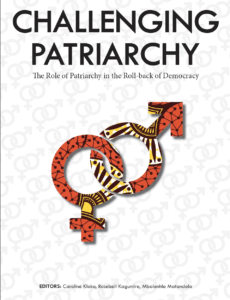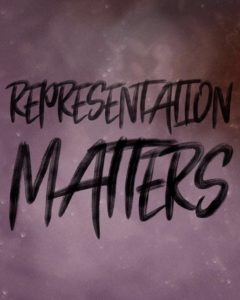Ethiopian Feminist Zemdena Abebe, in an article published in October 2019 asserted that “democracy is defined as a structure of decisionmaking where power is exercised by the people because our default definition of people is ‘men’, democracy can be understood as ‘the rule of men”. I found myself reflecting on those words on May 28, 2020, during the launch of a book described as, “for us, by us and about us” via Facebook Live by Heinrich Boll Stiftung-Nairobi in partnership with African Feminism titled “Challenging Patriarchy: The Role of Patriarchy in the Roll-Back of Democracy”.
The exclusion of women and women’s voices is a song I know too well but I am equally exhausted by. The same day the book was launched which doubled as Menstrual Hygiene Day, African feminists on Twitter in solidarity with Ghanaian feminists were pushing back on an all-male panel discussing menstrual hygiene. A reminder that stories and experiences of women are always hijacked by what the system of patriarchy considers the default leaders – men.
In Uganda, every Thursday two Television stations host two political shows. And every Thursday you can count on one thing- that it will be a manel, and once every random Thursday (perhaps in March) there will be a token woman panelist who will be constantly interrupted by men referring to her as, “my sister.” Feminists are tired; of asking that these changes, of explaining why representation of women is important, of volunteering to do the work for the media of finding women to be hosted, and for me that exhaustion has turned into a permanent rage.

It is infuriating, to say the least how the inclusion of African women is continuously treated like a favour when we make up half or more of our countries that claim democratic. Men are considered default experts on all issues including those that primarily concern women, and as I listened to Caroline Kioko during the launch speak about democracy in Africa and how she felt that it is important to put out the facade that democracy is because it does not include everybody. I felt a justification of this rage.
In an engaging one-hour conversation moderated by Amina Jasho with editors; Rosebell Kagumire, Caroline Kioko, and Mbalenhle Matandela the audience; learned about the rationale behind the book. We got a glimpse of the ideas and themes in the book, had a brief tour of the journey and process of writing the book, shared in the excitement of the editors, and were informed about where and how the book will be distributed.
Participating in the launch of this book was exciting for me not only for its promise to interrogate the meaning of democracy in Africa and what that means for African women but also that we are no longer allowing the exclusion.
“A state merely declaring itself as does not necessarily mean it adheres to the principles of democracy. The book came about as a way of trying to look at inclusion, democracy, and patriarchy and how the three integrate,”- Caroline Kioko.
Women and other minorities are resisting the idea that the democratic agenda is all-inclusive. The one that allows; governments to make public commitments to uphold the rights of women but fail to mitigate maternal mortality, media houses produce content to celebrate women on women’s day and mother’s day while keeping rapists on their payroll, or religious groups preaching love to fill their collection bags while perpetuating misogyny and homophobia.
“ The writing is about what is unseen to the public and writing what the gaps are between reality and policy, and exposing stories about marginalized people in each of these countries,”- Mbalenhle Matandela

Through such books, African women find another platform to document their resistance. The exclusion of women by what is considered democratic governments has been resisted by African women for centuries and now more than ever we have proof of it. From fighting against dictatorship in Sudan to marching against femicide in East and South Africa to demanding equal representation in public spaces,
“African women are contesting and protesting power in the different arena both private and public. We tend to think that democracy is just something only in relation to the public institutions but you cannot really have an idea of freedom when it does not start from the private space,” –Rosebell Kagumire”
At a glance, the book is also an exploration of African Feminism (s). According to Kagumire, it espouses the struggles of women and minorities on the African Continent, not just against patriarchy but also capitalism and the fact that women and minorities have been at the core of fighting for their rights and the rights of the continent from western hegemony.
“African feminism exists outside of the resistance to western feminism. It is a myriad of heterogeneous experiences”- Caroline Kioko
I will be reading this book of the lived experiences of African women and minorities. There is power in owning our narratives and telling our stories because Lorde knows how much of our history has been erased, diluted, and presented us as passive subjects to the revolution.
I hope we can read it together and talk about it because,
“It is an array of innovative commentary on the politics, a snippet of historical and contemporary resistance of women, an exploration of other meanings of democracy, Sexual, Reproductive Health and Rights and liberation movement(s)…These are not histories, they are herstories. There is the unfinished liberation of women that many of our feminist ancestors started…It is like reading a new generation of writers, writing about resistance”- Mbalenhle Matandela
It is available for free on the AfricanFeminism website.
Komusana Fionah is a feminist lawyer and blogger. She is a 2018 Tuwezeshe Akina Dada fellow under Akina Mama wa Afrika’s African Women’s Leadership Institute. Find her on Twitter @komusana
